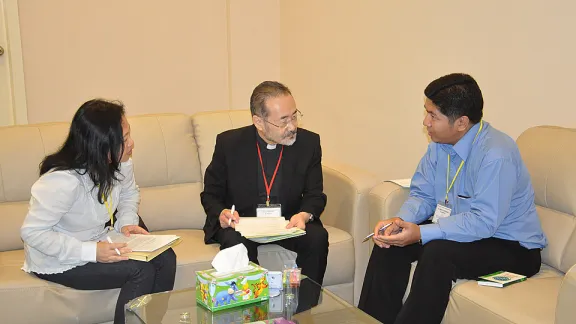
Left to right: Ms Lin Yew Chin (Singapore), Rev. Dr Eto Naozumi (Japan) and Rev. Martin Lalthangiana (Myanmar) during a group discussion at the LWF conference on Lutheran identity in Asia. © LWF/W. Chang
Theologians Explore Lutheran Identity in Context
Lutheran leaders and scholars from seven Asian countries concluded that the urgent task of establishing a Lutheran identity in Asia should be rooted in the various cultural contexts in which the churches serve.lutheran
Meeting in Kota Kinabalu, Malaysia, under the theme “An Asian Perspective of Lutheranism and Lutheran Identity in a Post-Modern Era,” 20 Lutheran churches and seminary representatives noted that Lutheranism in Asia offers important insights to the worldwide communion as it approaches the 500th anniversary of the Reformation in 2017.
The Lutheran World Federation (LWF) Department for Mission and Development (DMD) organized the 20-24 August conference at the Sabah Theological Seminary as part of LWF’s aim to support member churches, theological institutions and networks to respond to their respective contexts.
“The Asian contextual understanding of Lutheranism can enrich the LWF Communion by enhancing a better understanding of each other and the different cultures,” said Rev. Dr William Chang, LWF area secretary for Asia.
Theologians delivered papers reflecting the diverse Asian perspectives on applying Lutheran principles that help interpret scripture. Their presentations focused on how the different options for understanding Lutheranism can help churches live faithfully to the gospel in ways that are relevant within their cultural, traditional and societal realities.
Rev. Dr Kenneth Mtata, study secretary for Lutheran Theology and Practice at the LWF Department for Theology and Public Witness (DTPW), urged a reading of cultural contexts before asking: “‘What is God calling us to do?’”
Rev. Dr David Udayakumar of the Gurukul Lutheran Theological College and Research Institute at Chennai, India, highlighted the difficulty of finding a common Lutheran identity in his country because of the diverse local cultures and lack of understanding of the law and the gospel.
Reflecting on Indonesian responses to Lutheranism, Rev. Dr Mangisi Simorangkir of the Protestant Christian Church said that the Batak culture helped provide Lutherans with a communal identity amidst the country’s cultural diversity.
Bishop Dr Lip Tet Thomas Tsen of the Basel Christian Church of Malaysia explored why the church needs the law from Luther’s writing, while Dr Thu En Yu of Sabah Theological Seminary suggested that the use of Confucian ideas of loving kindness and righteousness help Chinese grasp the law and the gospel in Lutheranism.
The papers prompted lively debate on the nature of Lutheran identity in Asia and its relevance to the region’s diverse social and economic issues, cultures and ethnicities, and concerning how biblical truths apply in the various contexts.
“There is an urgent need to establish our Lutheran identity in Asia so as to identify who we are, our position and also contribute to the wider Christian community,” said Bishop Philip Lok of the Lutheran Church in Malaysia and Singapore.
Participants outlined how the churches and theological schools are creating a Lutheran identity in the region through the training of pastors, study programs and research on Luther, though some highlighted the difficulties presented by cultural differences.
Shirley Cheng of the Southeast Asian Lutheran Communion (SEALUC) Women in Church and Society (WICAS) network said the conference had helped outline a new way for Lutheran women to serve the church.
“Women have a very important role to play and when we fully understand our Lutheran legacy, we can be further empowered to serve at various levels,” she added.
“This conference has … provided a clear process and destination for the journey,” said Steven Ju of China Lutheran Seminary, Taiwan. For Dr L. B. Siama of Lorrain Theological College in Myanmar: the gathering had “established a very clear process for the way forward.”
(608 words)


